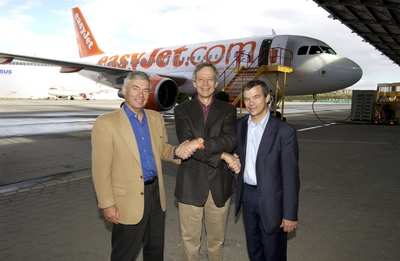Says Some Aircraft Are "Too Dirty to Fly"
On the heels of easyJet receiving its 100th Airbus A319, the
airline began calling on European governments to remove almost 700
of the oldest, dirtiest aircraft from Europe's skies by banning any
aircraft built before 1990 from operating within the European Union
after January 1, 2012.

Citing data from AirCraft Analytical Systems, the carrier says
678 planes in use today were built before 1990. If they were all
taken out of service and replaced with the cleanest planes
currently available, there would be emissions savings of up to five
percent, according to the carrier.
According figures from Airbus, a 1980s-vintage MD-82 generates
21 percent more CO2 per seat than an A319 with equivalent seating;
easyJet's data showed the A319 to be 15 percent more efficient per
seat than the Boeing 737-300. Boeing claimed recently the upcoming
787-9 Dreamliner will burn 27 percent less fuel per passenger than
older-generation A340-300s it is positioned to replace.
The initiative comes as the European aviation industry struggles
to show it is taking global warming seriously -- and is
advantageous to the low-cost carrier, as well. The average age of
easyJet's 130 aircraft is 2.2 years, making it one of the youngest
fleets in Europe. Calling for older planes to be scrapped will cost
easyJet nothing, according to the European Federation for Transport
and Environment (T&E).
Another British carrier is also making attempts
to reduce carbon emissions by aircraft. As ANN reported, Virgin
Atlantic CEO Richard Branson has entered into a partnership with
Boeing to develop a bio-fuel for jet engines... and both parties
believe they can fly a 747 with one engine running on biofuel as
early as next year.
"The positive effects of biofuel will hopefully reduce or almost
get rid of the airlines' contribution to global warming," said
Branson.
Ground testing is scheduled to begin soon. A test flight could
actually happen by the end of 2008.
 T&E calculates it would
take around half of Great Britain's supply of arable land to fuel
Virgin Atlantic's fleet on soy- or rapeseed-based biofuels.
T&E calculates it would
take around half of Great Britain's supply of arable land to fuel
Virgin Atlantic's fleet on soy- or rapeseed-based biofuels.
"Unlike some issues in aviation which need global agreement --
this could be very straightforward, so there is no excuse for
inaction. The vast majority of aircraft flying short-haul routes
within Europe are on European-registered airlines which can be
covered by a legislative proposal from the European
Commission," said Andy Harrison, easyJet Chief Executive
Officer.
Carbon offsetting is one of the most popular means to compensate
for CO2-generating activities such as flying or driving. In theory,
it allows consumers to contribute to projects such as tree planting
to offset the environmental impact of their flight or commute.
Although easyJet's ecology-minded posturing is impressive,
'going green' still seems to be focus on the greenbacks. According
to the UK Guardian News, the low-cost airline delayed the launch of
an offsetting program because of concerns over its cost.
Instead of following common industry practice of engaging
companies that utilize common offsetting practices, easyJet says
will go it alone by acquiring credits in UN-accredited programs and
selling them back to customers.
EasyJet Communications Director, Toby Nicol, said the company
had been "shocked" by how much money carbon offsetting firms were
charging. "We have been quite surprised at the percentage that the
offsetting companies would like to take out of the scheme for
administration costs... that was simply too expensive," he
said.
Fellow airlines dispute easyJet's claims. A spokeswoman for
British Airways, which launched its offsetting program in 2005,
said it was "not aware" of offsetting firms charging excessive
fees. BA said it uses Climate Care, one of the best known
offsetting companies, according to the Guardian.
According to Nicol, "There are a lot of people who have dived
into the market who are desperate to make a margin from it. There
are too many snake oil salesmen in the business."
 ANN's Daily Aero-Linx (04.16.24)
ANN's Daily Aero-Linx (04.16.24) Aero-News: Quote of the Day (04.16.24)
Aero-News: Quote of the Day (04.16.24) Airborne 04.10.24: SnF24!, A50 Heritage Reveal, HeliCycle!, Montaer MC-01
Airborne 04.10.24: SnF24!, A50 Heritage Reveal, HeliCycle!, Montaer MC-01 Airborne 04.12.24: SnF24!, G100UL Is Here, Holy Micro, Plane Tags
Airborne 04.12.24: SnF24!, G100UL Is Here, Holy Micro, Plane Tags Airborne-Flight Training 04.17.24: Feds Need Controllers, Spirit Delay, Redbird
Airborne-Flight Training 04.17.24: Feds Need Controllers, Spirit Delay, Redbird




